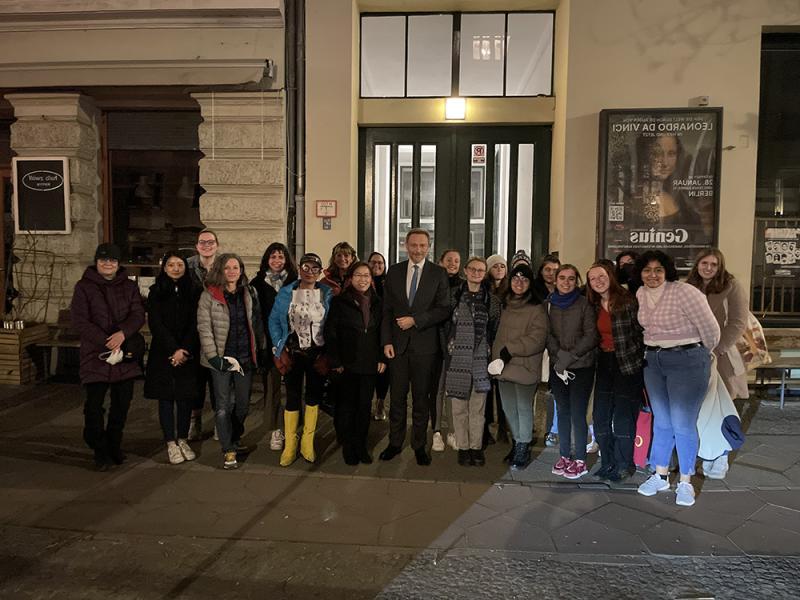Students and faculty in 360° "Europe from the Margins" spent spring break visiting Berlin to learn first hand about the topics they've been discussing in their classes. Ellison Warmath '22, who is majoring in German, shares her thoughts on the experience in the piece below.
Throughout the spring 2022 semester, 15 motivated Bryn Mawr College students, myself included, have had the privilege of participating in the 360° Program’s cluster “Europe from the Margins,” in which we have studied the historical and modern-day experience of minorities and marginalized peoples across the continent.
Since January, we have ventured beyond simplistic, normative characterizations and begun to develop a more realistic and complex idea of European society. Everything we read, discussed, and analyzed culminated in a 10-day spring break trip to Berlin, one of Europe’s largest and most diverse metropoles, where we had the opportunity to learn from local citizens, artists, refugees, religious leaders, and politicians, including Germany’s Federal Minister of Finance Christian Lindner and representatives from the Social Democratic Party (SPD) of Germany.
The opportunity to speak with Lindner, one of the most highly ranked members of the German government and the chairman of the FDP (Free Democratic Party) provided us with some clarity regarding Germany’s official positions on many issues in our focus. We met with Lindner on March 6. He came straight from a televised interview to famous artist and friend of the politician Jiny Lan’s Berlin residence, where our whole group sat, surrounded by masterpieces, and eagerly awaiting answers to a laundry list of questions inspired by our coursework.
Upon his arrival, we got straight to the point, asking about the impact of the war in Ukraine on the international community, the implications for future German aid initiatives, the German government’s plans in fighting climate change, and so on. While often uncertain due to the delicate and rapidly-evolving nature of the war, Lindner’s answers gave us unique insight into the shock waves radiating from the invasion, as well as the many doors this critical juncture has opened for pan-European cooperation. He noted, “If there is only one good news out of this situation, the democracies are cooperating more closely than before.”
The following day, we were lucky enough to visit the headquarters of the SPD and speak to representatives from the executive committee: Volker Norbisrath who is the political advisor to Chancellor Olaf Scholz on issues of migration and integration, and Leonard Pledl who is an advisor for European affairs in the International Secretariat.
It was truly fascinating to see how people with different political leanings addressed the Russian invasion in Ukraine and similarly interesting to hear about the SPD’s continuous efforts to advocate for minorities throughout the country. We also learned a great deal about the SPD’s dynamics with other leading parties in Germany as well as the position of the party and country within the European Union. While at times vague with their answers, Lindner and the SPD officials have provided us with plenty that we eagerly look forward to dissecting in the remaining weeks of the semester.
Three 360° course clusters will run this fall (Climate Change; Minerals, Museums, and Western Colonialism; Taste) and one cluster will involve courses across both semesters of next academic year (Paradigms of Revival). All applications must be submitted by Wednesday, April 6, at noon. Contact Sarah Theobald stheobald@wolaipei.com with any questions or for more information.
